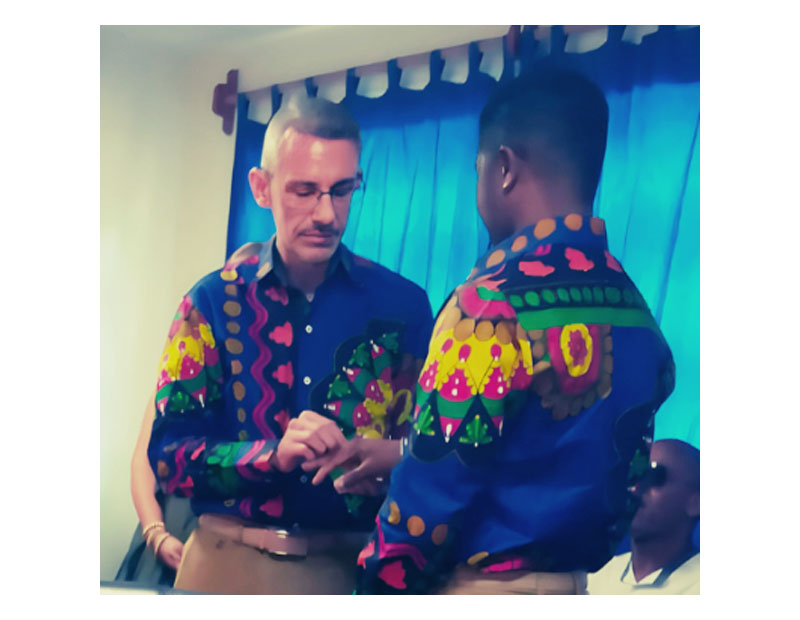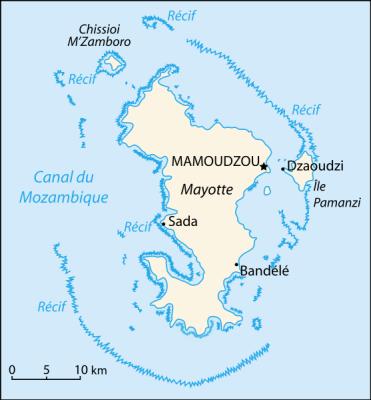Couple’s struggle exposes anti-LGBT bias on French island Mayotte in Indian Ocean
Moïse Manoël-Florisse, is an African-Caribbean online journalist keeping an eye…
Same-sex marriage is allowed on Mayotte — a rarity in Africa and the Islamic world

On the island of Mayotte in the Indian Ocean, the gap between queer people’s legal rights and their lived realities can be stark. Officially, as residents of a French territory – Mayotte voted to remain part of France when neighboring Comoros declared independence in 1975 – LGBT people in Mayotte are entitled to all the same rights queer people do in metropolitan France, including the right to same-sex marriage. That makes the predominantly Muslim island a rare exception in the Islamic world and African region.
Bruno Agar, who teaches at the university center of Mayotte, spoke to Erasing 76 Crimes about the difficult path to marry his Malagasy partner, Abdallah (pseudonym).
76crimes: Bruno, can you tell us about the process of marrying your partner in Mayotte?
Bruno Agar: It was long and complicated, but it illustrates the complexity of the application of French laws in another social and anthropological context outside Europe. However, belonging to the French national community implies rights and duties. Our struggle to be able to get married demonstrates the long road to equality that still remains to be traveled in Mayotte today, in all areas.

Initially, Abdallah and I wanted to get married in September 2022. By August 2022, we had already filed all the documents at the Sada Town Hall, but we were met with passive resistance from the civil registry office. Finally, our marriage could not be realized until March 2023. Nevertheless, we are extremely relieved and happy.
When we filed our application, we made up the appropriate application and no other administrative document was requested. However, we were not given any proof of filing the marriage application.
Then, my partner’s certificate of accommodation was refused, although we had been living together for several months. The Town Hall does not have the right to do this. It is totally illegal.
Also, they required us to show bills in my partner’s name, but [we didn’t have any such bills].
Because of that, we needed help from multiple resources. First, on the spot, from the local defender of rights. Then we were assisted by our own lawyer who knows the subtleties of local life. Finally, we made a report with [French LGBT advocacy group] SOS Homophobie. We have also referred our case to the public prosecutor.
It is clear that these administrative infringements by the municipality of Sada are motivated by homophobia. It is a silent and perniciously violent form of discrimination.
We tried dialogue through registered letters to the mayor. We asked to be able to speak with the deputy mayor in charge of civil status issues. But each time we received no response.
In overseas territories, one must constantly juggle between [official] French and European [Union] laws and the application of the law on the spot, also with regard to local mentalities and customs. Moreover, Mayotte is an almost exclusively Muslim island, with mosques in every village.
On the day of the wedding, the deputy mayor in charge of civil status did not come to celebrate our union and we waited for about 40 minutes in vain. Finally, another deputy mayor came and deigned to marry us, specifying that she was obliged to do so and that she had no other choice. She called my companion “Miss,” specifying that it was written that way in the official documents.
76crimes: What has changed for you and Abdallah since you got married?
Bruno Agar: Abdallah is recognized as a refugee by the French Office for the Protection of Refugees and Stateless Persons (OFPRA). In theory, he can work, but in practice, until he receives a residence permit, his rights remain virtual. For health insurance, it’s the same. He will have to wait until he receives a social security card. It always takes time, and even more so in overseas territories where public policies take longer to be implemented due to the historical, economic, political and social specificities of each territory.
It’s a bit paradoxical, because my partner and I could have waited a few more months to get married next year in France, but we preferred to do it in Mayotte.
We can’t ignore that even if we live in a territory under French jurisdiction, there is no LGBT+ association here, nor even the slightest place of socialization for gays and lesbians. I even wonder about the number of same-sex marriages that may have been celebrated here?
76crimes: In this context, what does Operation Wuambushu, the expulsion of several thousand illegal immigrants living in unsanitary shantytowns in Mayotte, evoke for you?
Bruno Agar: You have to live with the realities of your geography and Mayotte is located in the Mozambique Channel, in between the impoverished states of Madagascar and Comoros. Illegal immigrants from the neighboring Comorian island of Anjouan can easily return to Mayotte, even after being deported by the authorities.
Also, the geography of the region implies a history between these islands of the Indian Ocean that the French annexation of Mayotte cannot erase.




